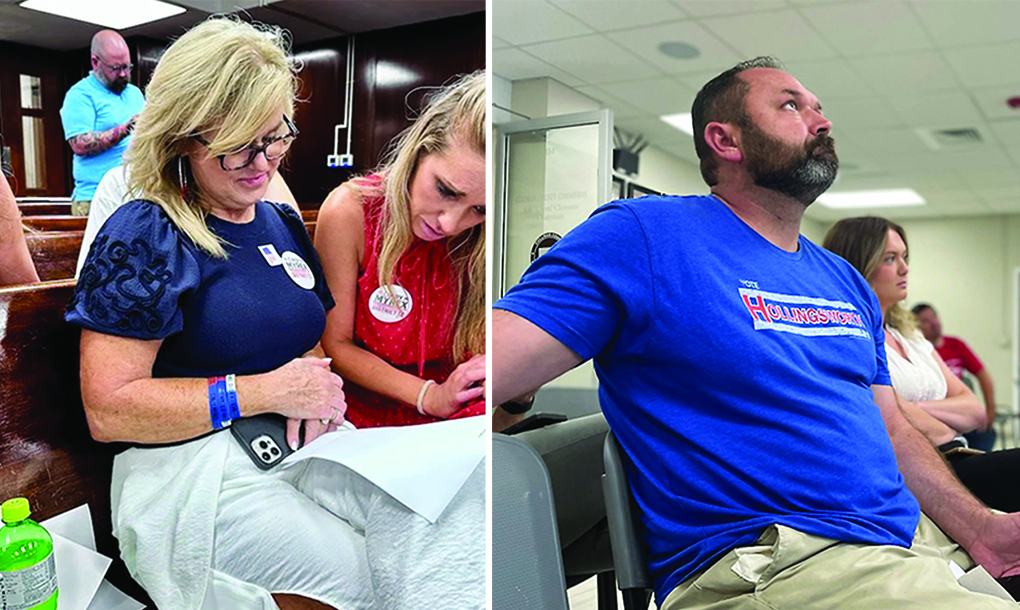Schools should screen for dyslexia, advocates say
Published 12:38 pm Friday, May 29, 2015
BOSTON – When Melissa Marquis’ son Ethan entered first grade, she noticed something was wrong. He wasn’t reading and writing at grade level. He seemed disinterested in class.
Marquis was even more upset to learn how his teachers at Shawsheen Elementary in Andover dealt with the situation.
Trending
“He wasn’t allowed to participate in reading group,” she said. “They were telling him to sit in the back of the classroom and play with Legos while the other children were reading. They felt he wasn’t putting in enough effort.”
Ethan was evaluated by the school district and began taking special education classes, but he was still trailing other students, she said.
Frustrated with his lack of progress, Marquis dropped more than $3,000 on private tests. She was told her son had dyslexia – a neurologically-based learning disability that involves difficulty reading and spelling.
Marquis had to push for specialized instruction for Ethan because the state treats dyslexia as a general learning disability. In Andover, schools have since modified their approach, but Marquis still pays for private tutors.
The experience has led Marquis to join advocates seeking changes in state special education laws. They want early screening and intervention for dyslexia, which studies estimate affects up to 17 percent of children.
“This is a civil rights issue,” she said. “It’s no different than providing ramps for the handicapped. It’s about access.”
Trending
Lawmakers are considering ways to approach the problem.
A proposal by Sen. Barbara L’Italien, D-Andover, who sits on the Joint Committee on Education, requires early screening. It calls for regular teacher training on the learning disability, its signs and intervention strategies. It also requires schools to adopt “evidence-based dyslexia remediation” programs.
“Teachers want to help but often feel ill-equipped to provide the support and services that are needed,” L’Italien said.
Lisa Nelson, a Groton advocate whose daughter has dyslexia, said many children go undiagnosed because dyslexia isn’t recognized as a disorder in Massachusetts and many other states. Even when diagnosed, children often don’t receive the specialized instruction they need because there is no statewide framework for dealing with dyslexia, she said.
“Teachers aren’t trained, and many schools don’t even know what dyslexia is,” said Nelson, co-founder of the Massachusetts chapter of Decoding Dyslexia, a national advocacy group. “Most kids are labeled as learning disabled, which is too vague.”
“That’s like told that your child has cancer but not being told what kind of cancer,” she said. “You can’t treat it that way.”
L’Italien’s bill is backed by Sen. Joan Lovely, D-Salem, and Rep. Marcos Devers, D-Lawrence, though proponents are gearing up to lobby other lawmakers for support.
Similar legislation, filed by Rep. Alice Peisch, D-Wellesley, requires screening for dyslexia and other reading disabilities by the second grade. Peisch’s bill gets it first airing before the Education Committee on June 17.
State education officials say they treat dyslexia as a general learning disability and don’t screen for it specifically.
They point out that the state provides special education for students diagnosed with dyslexia, though there are other factors to consider.
“Having a disability – whether it’s dyslexia or something else – does not on its own mean a child needs special education,” said Jacqueline Reis, a spokeswoman for the state Department of Elementary and Secondary Education. “The disability has to interfere with their learning. If a student’s dyslexia interferes with his or her learning, then yes, he or she would qualify for special education.”
On Thursday, advocates met with lawmakers at the Statehouse, where parents and children diagnosed with dyslexia talked about the frustrations associated with trying to get help.
“My teacher told me I wasn’t trying hard enough, even though I was giving it my all,” said Kate Lovett, a North Andover sixth grader. “I really didn’t know anything was different. I was angry. It wasn’t fair.”
L’Italien, who as a state representative championed a law requiring insurers to provide more coverage for autistic children, said requiring the state and schools to expand screening and intervention likely comes with a cost. But doing nothing costs even more in the long term, she said.
“We have to look at the bigger picture,” she said. “Failure to identify the problem means those kids are going to fall behind, and they’re going to be put on special education or seek placement out of the school district, and there’s a cost to that.”
Dyslexia has serious long-term consequences that affect a child’s education and behavior, said Elizabeth Norton, a neuroscientist at the McGovern Institute for Brain Research at the Massachusetts Institute of Technology.
“Children with dyslexia have lower self-esteem, increased rates of depression and entry into the juvenile justice system, and a lot of other negative consequences of not being able to read,” she said. “But the research has also shown that children with dyslexia tend to have other strengths, such as higher-than-average intelligence, so they’re pretty good at covering it up.”
Early screening – in kindergarten – is essential to getting a child on the right track, she said.
“If you identify a child early, it’s easier to close that gap and kids have better academic outcomes,” Norton said.
There is disagreement within the medical community about defining dyslexia, which is genetic and can pass from mother to child, said Norton. Two years ago, the American Psychiatric Association, in a controversial move that outraged advocates, dropped the disability from its clinical reference book, the Diagnostic and Statistical Manual of Mental Disorders.
“It’s the most common learning disability,” she said. “Any classroom is likely to have two or more children with dyslexia.”
Under federal law, students with dyslexia qualify for special education services, but advocates are pushing Congress to provide more resources and support to states for more early screening and intervention.
Marquis said Andover schools have made great strides in dealing with dyslexia. They’ve added specialty reading and writing classes tailored for dyslexic students and are training elementary-level teachers to recognize the disorder.
In addition to getting help in his current school, Sanborn Elementary, Ethan has private classes using the Orton Gillingham technique, a program that enables dyslexic children to read.
“He’s still a grade behind, but he’s reading now and doing really well,” Marquis said. “When we started, his progress wasn’t even measurable.”
Still, she and other advocates say tens of thousands of students across the state are falling through the cracks.
“It’s important that schools understand it,” she said. “But its even more important that the state gives them the support and resources they need to help children overcome it.”
Christian Wade covers the Statehouse for CNHI’s Massachusetts newspapers. Reach him at cwade@cnhi.com






